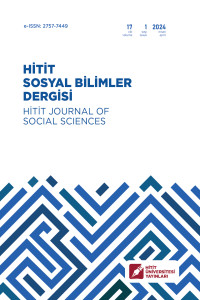Dijital Evren “Metaverse” Platformlarındaki İşlemlerin Muhasebe Faaliyetlerine Etkisi
The Effect of Transactions on Digital Universe “Metaverse” Platforms on Accounting Activities
Author(s): Nisa Kıymet ŞahinSubject(s): Accounting - Business Administration, ICT Information and Communications Technologies, Socio-Economic Research
Published by: Hitit Üniversitesi
Keywords: Accounting Science; Metaverse; Meta Accounting; Crypto-Asset; Digital Transformation;
Summary/Abstract: Metaverse, which is mentioned with the birth of the internet starting with Web 1.0 and its availability to individuals, blockchain, token, NFT, artificial intelligence and eventually web 3.0, is one of the most talked about topics in the technology world recently. The Metaverse, which we are still on the way to discover, goes beyond the physical world we are in, thanks to the digital avatars of the users, education, sports, entertainment, finance, tourism, fashion, games, etc. It is a virtual three-dimensional universe where they can perform all kinds of activities. It is said that this new world order, which integrates advanced technologies, will also interact with the physical world through technologies such as augmented reality, virtual reality and holograms. The increasing interest in combining the digital and physical worlds and the rapidly increasing global Metaverse market size are causing many companies around the world to increase their need to enter a broader market by using new information technologies and to change their investment strategies to adapt to the new virtual universe to capture potential business opportunities. For this purpose, Metaverse, known as the Internet of the Future, is expected to be platforms that will include many sectors such as marketing, finance, fashion, art, education, commerce, medicine and logistics. It is clear that with the use of Metaverse platforms for commercial purposes, companies will be able to generate high amounts of income in the future within the metaverse and will affect accounting science because the profits can be converted into physical currency. The fact that businesses operate in the virtual world as well as in the physical world requires the existence and control of the accounting information system. Current international accounting standards appear to contradict the needs of the digital age. When the literature review was examined, it was seen that although scientific studies examining the Metaverse concept with different disciplines have been carried out in recent years, the studies in the field of accounting are quite limited. The fact that it is a comprehensive study examining the impact of metaverse transactions on accounting activities reveals the originality of this study. This research was conducted to determine the extent of the need for accounting on Metaverse platforms, which are cutting edge of technology. It has been concluded that as long as there are commercial transactions in virtual universes, there is a need for the accounting profession, and that the goals of accounting systems will remain the same, but will significantly affect the traditional accounting paradigm by reshaping the way of doing business. While the Metaverse market size is estimated to exceed approximately $1.3 trillion by 2030, it requires the accounting profession to focus on new perspectives for accounting practitioners. Given the global nature of the metadatabase spanning various geographies and jurisdictions, the accounting industry needs to take a proactive stance in recognizing the urgent need for tailored recommendations and solutions to overcome identified regulatory gaps and challenges in accounting and taxation. It is extremely important for trust. The study recommends that accountants develop new skills such as emotional intelligence and digital skills in the virtual world, that professional accounting organizations publish new standards regarding technologies such as digitalization, artificial intelligence and Metaverse, and that digital assets used in metaverses be legally recognized and systematized. If the future of the virtual universe is inevitable, the accounting science must act quickly in order to adapt to this new world order and legal regulations must be made against the risks arising from legal gaps in the international arena. Thus, the accounting profession will be able to access more of the data in the new process and will have the capacity to integrate data quickly. With this study, in order to improve the accounting and auditing in the metadatabase, international accounting and auditing organizations, professionals, academicians collaborate with experts in the field of information communication technology, and develop innovative solutions for the effective monitoring, reporting and evaluation of virtual assets in a way that is compatible with traditional financial reporting systems. It was concluded that more research is needed aimed at developing methods, updated standards and comprehensive frameworks.
Journal: Hitit Sosyal Bilimler Dergisi
- Issue Year: 17/2024
- Issue No: Sp. Issue
- Page Range: 54-75
- Page Count: 22
- Language: Turkish

